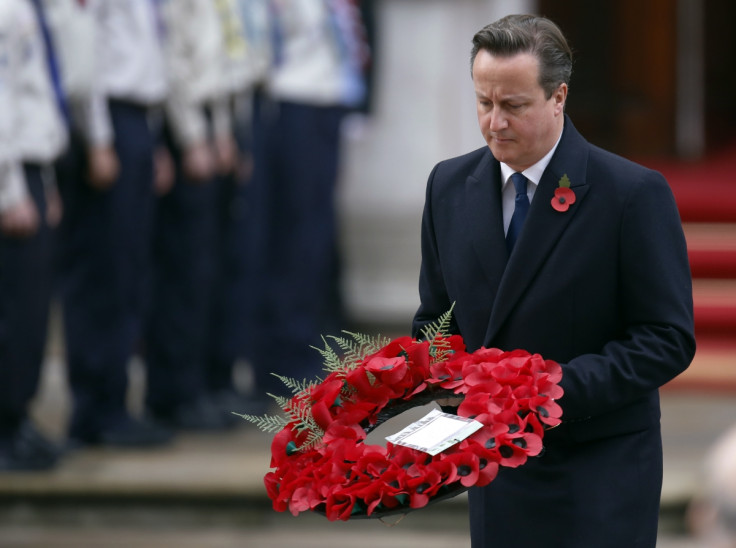Remembrance Day: Why the Cenotaph has become the dark heart of British militarism

On Sunday 8 November, Veterans For Peace UK marched to the Cenotaph for the third year in a row. The sole opposing military voice to the clamour of jingoism that has overtaken what was once, rightly, a solemn occasion. This year we were led by women veterans from the US and UK − a fact of which we are all particularly proud. They bore our group's colours, which are emblazoned with a call for peace, and lay a wreath of white and red poppies to remember all the war dead, rather than just one section of the slain.
In the last decade, against the background of failed and illegitimate wars in Iraq, Afghanistan and Libya, the meaning and value of the red poppy has become debated furiously in Britain.
At the cenotaph on Sunday [...], arms dealers, hawks and warmongers stand shoulder to shoulder as if to lament the deaths and injuries their actions inflict.
In one sense, this is a good thing, because those have now taken ownership of it − arms companies, the gutter press, unbloodied battalions of long-range patriots in parliament − must be challenged.
In Veterans For Peace UK, we have ourselves debated the poppy many times and a multitude views have emerged.
For our older generation of veterans, such as those who saw action on D-Day and in Malaya, men whose fathers were in the trenches of the Great War, the red poppy is still the symbol of insurgent anger and grief that it was at the start. Some of these men combine red and white poppies.
For many of the veterans of the 1980s, 1990s and, like myself, the 9/11 wars, the red poppy has fallen to the enemy − the aforementioned hawks and death-dealers − and is at best a deeply concerning symbol. Many of these veterans wear only the white poppy.
For years, I have worn neither white nor red, though I am increasingly drawn toward the anti-imperialist black poppy, which recalls the war dead of all sides, slaughtered civilian and the endless list of military objectors, rebels and mutineers.
All this aside, and in contrast to many military-oriented organisations at this time of year, Veterans For Peace do not preach about what poppy to wear, or if people should wear one at all. We honour the war dead by trying to limit their numbers, and we do that by putting the view, as women and men who have come to the cause of peace through military conflict, that war is not the answer to the problems of the 21<sup>st century.
Veterans For Peace, which is now hundreds strong, has always encapsulated a broad range of opinions and politics, as it should. Increasingly mine is that, while an important argument to have, the fight for the poppy is a row over a symbol. The fight for a future without the scourge of war is also partly the fight against militarism.
By that I mean the promotion of military values, the framing of the military as somehow noble and heroic and the priming and grooming of our population for wars to come, often by rewriting current and past conflicts. And militarism has been increased many-fold in recent years.
From The Sun's 'Millies' military awards and greater number of soldiers in uniform at sporting events, to the rise of very successful charities with a militarist tinge, like Help For Heroes, we are bombarded with a narrow, cultish, one-sided view of what the military is and what it does. To question this narrative is now a kind of apostasy.
One recent example is that of George Evans, a veteran in his nineties, who fought through Normandy. He was prevented from reading out a peace poem at his local cenotaph ceremony, which he had done in previous years. A Royal British Legion representative said this was because George would not stick to the script. This is one individual example of a broader trend.
The militarisation also involves targeting children and young people, for example by increasing the number of military cadet forces. Military values are also promoted as positive on a local level too, with the new armed forces "community covenant" being rolled out. Framed as an equalising initiative for armed forces personnel, it also, in effect, a programme of grass-roots militarism, the beating ideological heart of which is prizing the warrior over all others.
Our answer, as veterans who are tired of our name and our legacy being taken in vain and who reject militarisation, is to challenge the steady indoctrination of society.
That is why we marched to the cenotaph on Sunday, into what has become the dark heart of British militarism. Where arms dealers, hawks and warmongers stand shoulder to shoulder as if to lament the deaths and injuries their actions inflict.
And we will be there every year until our aims are achieved. Not to cause a scene, not to be contrary, but as a matter of duty to the generations who will follow.
Joe Glenton was a British soldier for six years, serving in Afghanistan, whose book Soldier Box was published in 2013. Follow him on Twitter at: @joejglenton
© Copyright IBTimes 2025. All rights reserved.






















